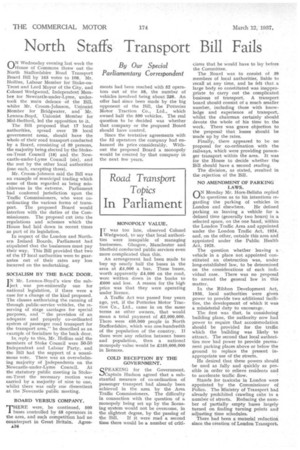Road Transport
Page 52

If you've noticed an error in this article please click here to report it so we can fix it.
Topics
In Parliament
I T was too late, observed Colonel Wedgwood, to say that local authorities were incapable of managing businesses. Glasgow, Manchester and Sheffield conducted public services even more complicated than this.
An arrangement had been made to buy up nearly half the buses in the area at £4,000 a bus. These buses, worth apparently 24,000 on the road, were written down in the books to £600 and lees, A reason for the high price was that they were operating under licence.
A Traffic Act was passed four years ago, yet, if the Potteries Motor Traction Co., Ltd., came in on the same terms as other owners, that would mean a total payment of £2,000,000. There were 450,000 people in North Staffordshire, which was one-hundredth of the population of the country. If there were any relation between buses and population, then a national monopoly value would be £150,000,000 in licences.
COLD RECEPTION BY THE GOVERNMENT.
SPEAKING for the Government, Captain Hudson agreed that a sub-. stantial measure of co-ordination of passenger transport had already been achieved in the area by the Area Traffic Commissioners. The difficulty in connection with the question of a monopoly being set up by the licensing system would not be overcome, in the slightest degree, by the passing of the Bill. If it were read a second time there would be a number of criti
cisms that he would have to lay before the Committee,
The Board was to consist of 39 members of local authorities, liable to recall at any time, and he felt that a large body so constituted was inappropriate to carry out the complicated business of transport. A transport board should consist of a much smaller number, including those with knowledge and experience of transport, whilst the chairman certainly should devote the whole of his time to the work. There was grave objection to the proposal that losses should be 'made up by the rates.
Finally, there appeared to be no proposal for co-ordination with the railways, which were providing passenger transport within the area. It was for the House to decide whether the Bill should have a second reading.
The division, as stated, resulted in the rejection of the Bill.
NO AMENDMENT OF PARKING LAWS.
ON Monday Mr. Hore-Belisha replied to questions as to his intentions regarding the parking of vehicles in
London and elsewhere. He defined parking as leaving a vehicle for a defined time (generally two hours) in a selected space, on the one hand, within the London Traffic Area and appointed under the London Traffic Act, 1924, and, on the other, outside this area and appointed under the Public Health Act, 1925.
The question 'whether leaving a vehicle in a place not appointed constituted an obstruction was, under long-established law, to be determined on the considerations of each individual case. There was no proposal to amend the general law in this matter.
In the Ribbon Development Act, 1935, local authorities were given power to provide two additional facilities, the development of which it was a ministerial duty to encourage.
The first was that, in considering building plans, the authority now had power to require that accommodation should be provided for the traffic which the building was likely to attract. The second that local authorities now had power to provide permanent parking places above or below the ground to replace the present inappropriate use of the streets.
He desired that these powers should be used as fully and quickly as possible in order to relieve residents and to accelerate traffic flow.
Stands for taxicabs in London were appointed by the Commissioner of Police. The Ministry of Transport had already prohibited crawling cabs in a number of streets. Reducing the number of partially empty buses largely turned on finding turning points and adjusting time schedules.
There had been a material reduction since the creation of London Transport.




















































































